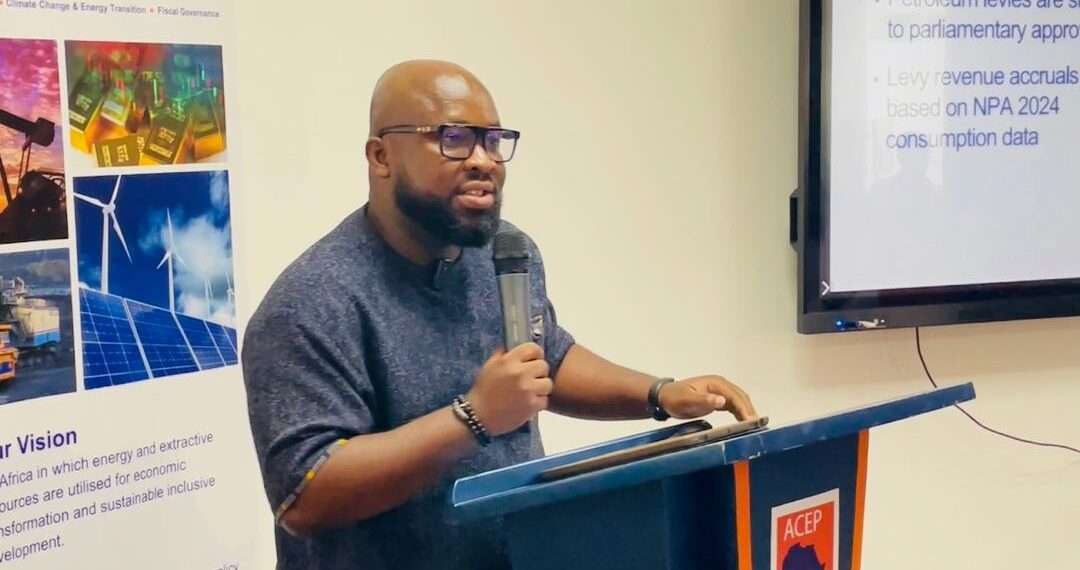The Government of Ghana generated approximately GHS 17.3 billion in revenue from taxes, levies, and margins applied to petroleum products in 2024, according to Kodzo Yaotse, Policy Lead for Petroleum and Conventional Energy at the Africa Centre for Energy Policy (ACEP).
These funds were collected from multiple revenue streams tied to energy consumption, raising questions about transparency and efficiency in their allocation.
Mr. Yaotse explained that these margins, taxes, and levies were tied directly to fuel consumption. “Cumulatively, in 2024, we raised an additional GHS 7.6 billion from margins, with GHS 9.7 billion coming from taxes and levies,” he stated.
For every litre of fuel consumed, these charges were applied, with 1,737 litres of products accounted for margins and 1,790 litres toward taxes and levies.
Despite the substantial revenue collected, Mr. Yaotse criticized the government’s allocation of petroleum revenues, noting that only the special petroleum tax directly supports energy consumption.
“The remaining levies are largely earmarked for addressing inefficiencies in the energy sector and servicing legacy debts,” he said.
For instance, the Energy Sector Debt Recovery Levy, intended to reduce the energy sector’s debt, has failed to significantly lower the outstanding liabilities. The debt remains at an estimated $3 billion despite consumer contributions.
Mr. Yaotse also highlighted the introduction of a new margin in 2024, which he argued has further burdened consumers without resolving inefficiencies in the energy sector.
Stakeholders and energy policy experts have long questioned whether the current system adequately supports national development goals or merely covers operational inefficiencies.
One of the most criticized aspects of petroleum revenue allocation is the Energy Sector Debt Recovery Levy. Introduced to reduce the energy sector’s debt burden, the levy has underperformed in meeting its objective.
Despite significant consumer contributions, the sector’s debt remains stagnant at $3 billion. This has raised concerns about the effectiveness of the levy and whether the funds are being misallocated.
Critics argue that without reforms to address inefficiencies and improve financial management in the energy sector, consumer contributions will continue to be absorbed by debt servicing without delivering tangible improvements.
Call for Transparency and Accountability

ACEP has therefore called for greater transparency in how petroleum revenues are utilized. The organization urged the government to prioritize investments in critical energy infrastructure and efficiency improvements over servicing what it termed “political sins of the past.”
“We need to redirect funds toward sustainable solutions for energy production and distribution.
“Using these funds to service inefficiencies and legacy debts without addressing the root causes perpetuates a cycle of financial strain on consumers.”
Kodzo Yaotse, Policy Lead for Petroleum and Conventional Energy at ACEP
The introduction of a new margin in 2024 has further strained consumers, especially amid rising global fuel prices. ACEP and other advocacy groups have criticized this move, emphasizing that it does little to improve the sector’s efficiency or address systemic challenges.
“Adding new margins without addressing fundamental issues in the energy sector is not a sustainable solution.
“It only shifts the financial burden onto consumers without delivering meaningful benefits.”
Kodzo Yaotse, Policy Lead for Petroleum and Conventional Energy at ACEP
The GHS 17.3 billion generated in petroleum revenues highlights the significant financial contributions of Ghanaian consumers to the energy sector. However, the concerns raised by ACEP underscore the need for reforms to ensure that these funds are used effectively and transparently.
As Ghana navigates its energy challenges, the government must balance the need for immediate revenue generation with long-term investments in infrastructure and efficiency.
Without these reforms, the country risks perpetuating inefficiencies that undermine its energy sector’s potential and burden its citizens.
The coming years will be critical in determining whether Ghana can transform its petroleum revenue framework into a driver of sustainable development or whether it will continue to grapple with inefficiencies and public dissatisfaction.
READ ALSO: Minority Criticizes Ato Forson’s Evasive, Inconsistent Responses During Vetting





















